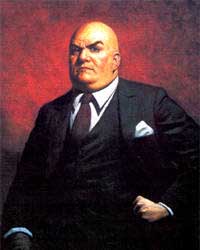
He is Emperor Palpatine. He is Goldfinger. He is Lex Luthor.
He is Evil. He is not misunderstood. He is not misguided. He is not morally confused. He is Evil.
He can be a woman, but it’s very rare. When he is a woman, she has no feminine qualities other than the ability to seduce… as a last resort.
He is intelligent. He is often more intelligent than the Hero (unless the Hero is a Competent Man, and even then it’s usually too close to call). He misuses his intelligence, however.
He is a sociopath. He likes to murder and he likes to cause suffering. This is his only true pleasure.
If he is wealthy, he will go out of his way to make sure you understand he’s wealthy. He is ostentatious in his enjoyment of wealth so as to cause envy in those around him. He uses his wealth to destroy others.
He is not a Thug. He does not like to fight (although he may be very good at it if required to). He prefers to win by his wits and his schemes. He prefers for other people to do his dirty business.
He does not love; he lusts and covets. If he desires someone (usually the Hero’s One True Love), it is not out of adoration or fondness; it is so that he can cage and ravish her.
Although he will invariably be defeated by the hero, his true downfall is from his own moral failings. He always creates the circumstances of his own downfall.
He has an endless supply of minions, thugs, patsies, and dupes, but he does not have friends or Sidekicks. He does not acknowledge the equality of anyone and he despises camaraderie of any sort.
The Mastermind is often ugly or disfigured, but he can also be very handsome. In either case, his twisted morality will make him ugly and unattractive to those who are virtuous.
He is a manipulator. He does not empathize with others, but he understands how others think well enough to bend them to his will. Words and emotions are his weapons.
He enjoys moral sophistry. He wants you to believe that he is not truly evil, and that you are not truly good, but he is lying. He knows that he is Evil and harbors no confusion or regret.
He does not believe in Good. He believes that those who are Good are deluded or weak. He doesn’t believe that the Hero would continue to be Good if the Hero were smart enough to open his eyes, but neither does he care.
He is hard to kill. You can destroy him again and again but he’ll usually escape at the last moment and Return Another Day. When you do actually kill him, however, it is a Cause for Celebration.
He is an atheist. It would be impossible for him to acknowledge a power greater than himself. If he does happen to "worship" Satan, it is only as a conduit for power.
Friday, July 27, 2007
Unstructured Archetypes: The Mastermind
Labels: Archetypes, Mastermind, Villain
Subscribe to:
Post Comments (Atom)

6 comments:
The earliest such character I know of is Moriarty(sp?). It seems to me that all subsequent masterminds are mere immitations of Holme's adversary.
I'm trying to think of an earlier example and am drawing a blank. I thought that Bram Stocker's Dracula might be a contender but the Moriarty precedes him by a decade (and, besides, I think Stoker's Dracula is probably closer to the Warlock archetype).
I do think that the Mastermind didn't really come into his own until the serials of the 30s.
I think a good candidate for an earlier "Mastermind" is Loki, in the series of stories surrounding Balder and his death, in the Viking mythologies.... One could argue similarly for Poseidon as the Mastermind that is fighting Ulysses in the Odyssey.
Loki is generally filed under the Trickster archetype but, then again, very few characters represent pure archetypes so a case could be made.
Similarly with Poseidon although I think his case would be more of a stretch. I tend to think of Poseidon as more of an Elemental but, again, this is debatable.
In some stories, Loki is the quintessential Trickster, yes. But in the particular saga leading to the Death of Balder and eventually Armaggeddon, I think he plays the role of Mastermind.
But in any case, while Moriarty is probably the first "distilled" occurrence of the Mastermind, I think there are other instances. Tulkinghorn in Dickens's "Bleark House" (1852-1853), preceding Moriarty by 40 years, for a literary one.
Or for that matter, isn't Satan the ultimate Evil Mastermind?
Touche.
Post a Comment